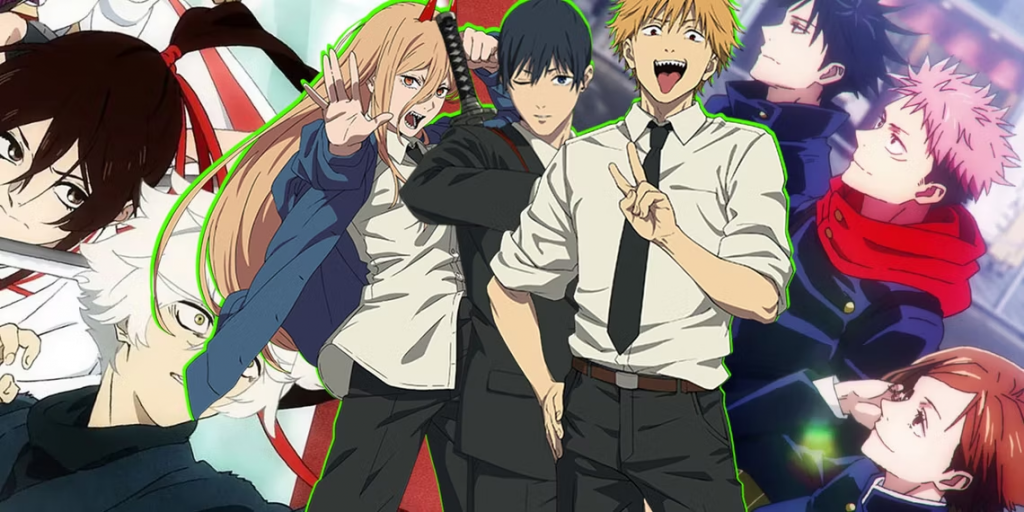
In the ever-evolving landscape of shonen anime, a trio of series has emerged as a force to be reckoned with. Chainsaw Man, Jujutsu Kaisen, and Hell’s Paradise have captured the attention of fans and critics alike, earning the moniker of the “Dark Trio” within the animanga community. Renowned for their dark and gritty themes, these series tackle serious and gruesome subjects, pushing the boundaries of the shonen demographic. However, amidst the bloodshed and mayhem, there lies a remarkable aspect that deserves recognition—their portrayal of platonic relationships and the lessons they impart about friendship.
Within the realm of anime, it is not uncommon for male protagonists to have female friends. However, more often than not, these friendships eventually develop into romantic interests. This trend is particularly prevalent in shonen stories, where the male-female dynamic tends to carry romantic implications. Take, for example, the relationship between Tanjiro Kamado and Kanao Kocho in Demon Slayer. While Kanao initially served as Tanjiro’s mentor, there was always an underlying suggestion that their connection would evolve into something more.
Similarly, in My Hero Academia, the friendship between Izuku Midoriya and Ochaco Uraraka began innocently enough as classmates supporting each other through their trials at U.A. High School. However, it didn’t take long for Ochaco’s feelings to develop into a crush on Izuku. These instances highlight how friendships between men and women often become entangled with romantic implications, leading to canonical relationships in many cases.
In contrast, the “Dark Trio” subverts these expectations by presenting characters who are purely friends, with no romantic undertones. Chainsaw Man’s Denji and Power, for instance, share a sibling-like relationship that blossoms over time. While they initially clash due to their defiant personalities, their bond strengthens to the point where they are willing to make sacrifices for each other. Despite numerous opportunities for their relationship to take a romantic turn, mangaka Tatsuki Fujimoto deliberately keeps it platonic. Denji’s lack of romantic attraction to Power is evident when he expresses no enjoyment during a physical encounter, realizing that his feelings for her are purely familial. Their shared experiences, including sleeping and bathing together, stem from a place of deep platonic love and understanding.
In Hell’s Paradise, the characters Yamada Asaemon Sagiri and Gabimaru find themselves abandoned on a mysterious island, forging a bond through their shared hardships. While circumstances could easily have led to a romantic connection, the series chooses to focus on their growth and mutual support as friends. Gabimaru recognizes Sagiri’s strength, even stating that she surpasses him in certain aspects. This validation helps Sagiri develop her confidence and become one of the strongest members of her clan. Moreover, Gabimaru’s unwavering loyalty to his wife is evident when he firmly rejects any advances from other female characters. The respect they share for each other’s boundaries and commitment to their friendship create a wholesome dynamic within the gritty and violent world of Hell’s Paradise.

Jujutsu Kaisen showcases another powerful duo in the form of Itadori Yuji and Nobara Kugisaki. While they initially clash due to their contrasting personalities, their friendship gradually strengthens over time. As they grow together as jujutsu sorcerers, their fighting abilities and teamwork improve significantly. Their bond goes beyond mere combat prowess, as they provide emotional support for each other. When Itadori was presumed dead but secretly being trained by Gojo Satoru, Nobara’s tearful reaction showcased her deep care for her friend. Similarly, when Nobara faced a tragic fate in the “Shibuya” arc, Itadori’s devastation and determination to avenge her demonstrated the depth of their friendship. These moments of emotional connection highlight the powerful bond they share and the importance of having a reliable and supportive friend by one’s side.
The refreshing aspect of these platonic relationships in the “Dark Trio” is their ability to depict meaningful connections without resorting to romantic tropes. While romantic relationships have their place in storytelling, showcasing strong and wholesome friendships between men and women is equally essential. By showcasing these friendships, the series challenge the notion that every male-female interaction must have a romantic outcome, allowing for diverse representations of relationships in anime.

Moreover, the portrayal of platonic relationships in these series serves as a valuable lesson about the significance of friendship. In a world filled with violence, danger, and supernatural battles, these characters find solace, strength, and growth through their genuine friendships. They rely on each other for emotional support, encouragement, and understanding, creating a sense of camaraderie that enhances their overall journey.
The impact of these friendships extends beyond the fictional realm. By normalizing and celebrating platonic relationships between men and women, these series send a positive message to their audiences. They challenge traditional gender roles and expectations, encouraging viewers to value and cherish non-romantic connections. This portrayal can have a profound influence on how individuals perceive and navigate their own friendships, promoting healthier and more balanced relationships.

In conclusion, the “Dark Trio” of Chainsaw Man, Jujutsu Kaisen, and Hell’s Paradise introduces a refreshing perspective on platonic relationships in shonen anime. By deviating from the usual romantic tropes, these series emphasize the value of genuine friendships and the strength they provide in the face of adversity. Through their well-developed characters and nuanced interactions, they inspire viewers to appreciate and prioritize platonic connections, challenging societal norms and fostering a more inclusive representation of relationships in anime.

We bring out some of the most well-known Jujutsu Kaisen Collection, all of which are available at reasonable costs. Visit our link now if you are interested in the Jujutsu Kaisen Collection
Jujutsu Kaisen Car Floor Mats, Nobara Mix Manga Style Car Floor Mats, Anime Custom Car Accessories
Jujutsu Kaisen Car Floor Mats, Ryomen Sukuna Car Floor Mats, Anime Car Accessories


Mai Zen’in,Rika Orimoto,Momo Nishimiya,Atsuya Kusakabe,Akari Nitta